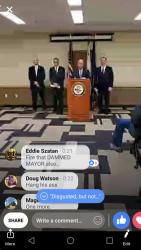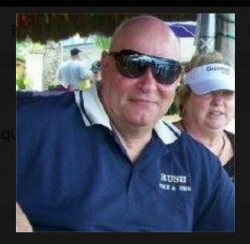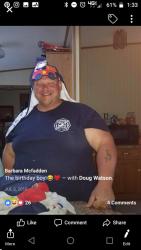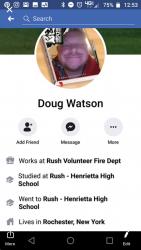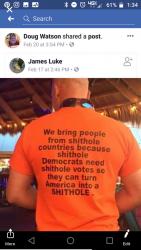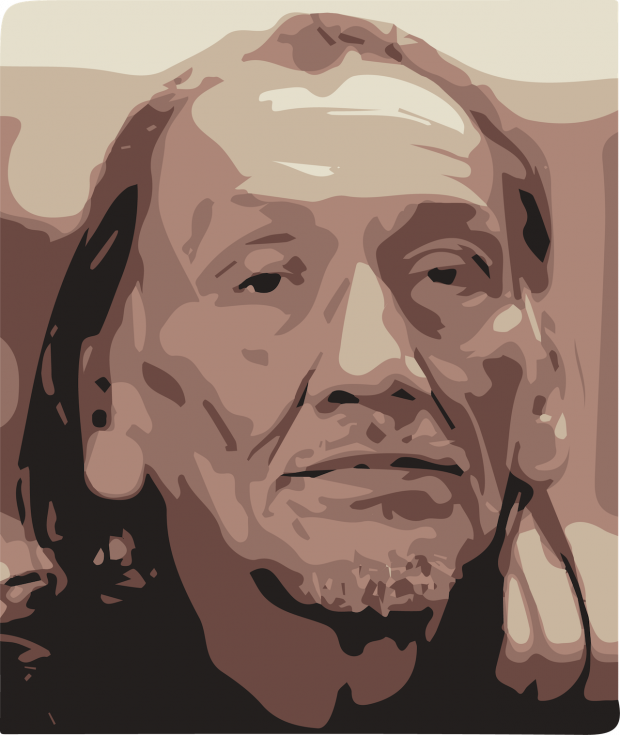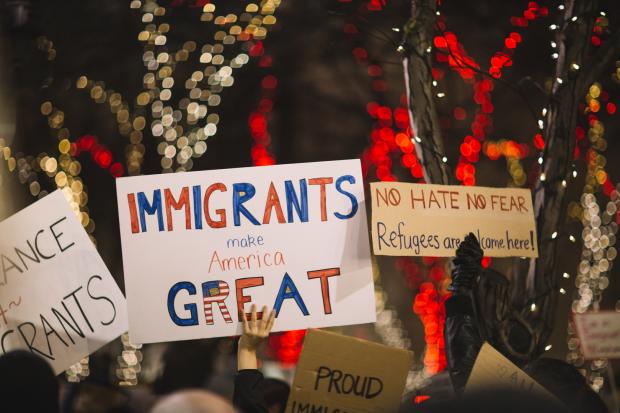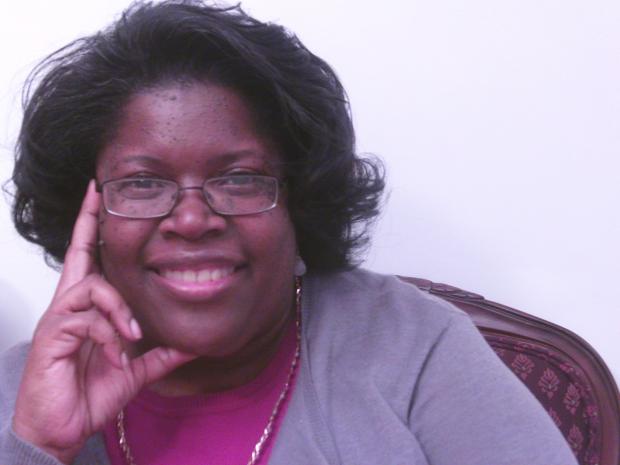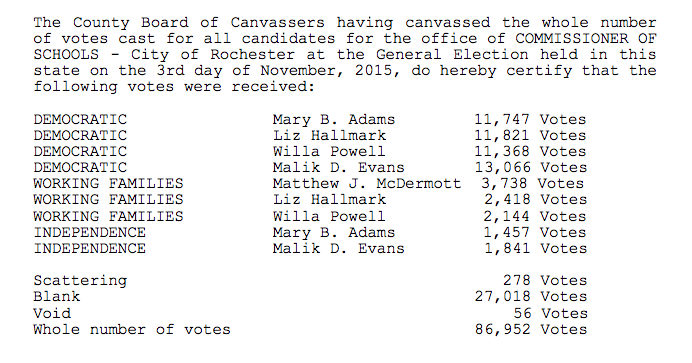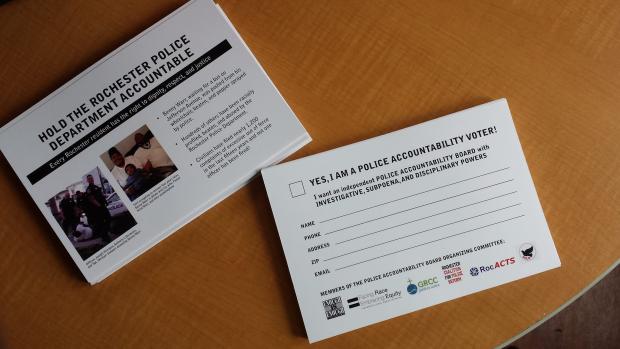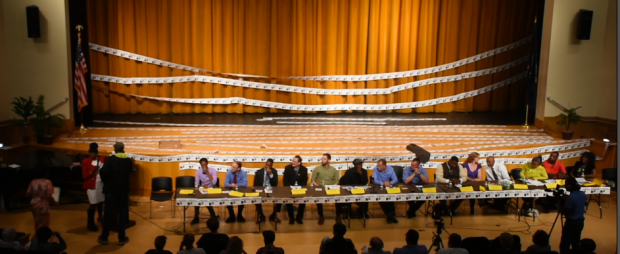Racism Running Rampant in Rush
Racism Running Rampant in Rush
“Hang his ass,” said by Rush Volunteer Firefighter Doug Watson about Rochester City Councilmember Adam McFadden; community members voice concern/anger via press release
On February 23 screenshots of Doug Watson’s social media posts came to the attention of people of color and anti-racist activists in Rochester, NY. Rush volunteer firefighter Doug Watson made the public comment “Hang his ass” during a live streamed press conference of prosecutors laying our their criminal complaint against Rochester City Councilmember Adam McFadden.
Many people sent emails, letters, Facebook messages and posts calling for accountability. Christopher Coles sent this letter demanding an explanation and was responded to after a lengthy delay:
“Hello and good morning,
“One of your servicemen Doug Watson has been quoted to sayin “hang his ass.” About a Black Rochester Elected official. This took place in an open forum.
“This certainly doesn’t reflect great customer service and an open attitude as it pertains to servicing the public.
“If my house were on fire, would the color of my skin.. keep it ablaze?? Is this the attitude that the whole of the department shares?? Surely this can’t be the official stance of the Rush Volunteer Fire department?
“I’m on my way to media... but before this takes place I’d like to ask what’s the official stance of Your department and your company mission statement?
“If I had my way... I would love to Recommend that this individual Doug Watson be terminated.. and not employed by your station ... or any station in the Rush, West Henrietta, or City of Rochester fire stations. His views and references to Racial Terror, provide danger to the public, and create a woeful mistrust of our most valued servicemen who we most trust in our precious moments of peril. I am available at any time for any correspondence.
“Thank you
“Christopher Coles - Concerned Citizen.”
The Town stated that they were conducting an investigation after the initial emails were sent.
In a related matter, retired New York State police officer and the former Rush Fire Chief Robert Faugh (photo to the left), made a comment about the letters coming into the town, that was inadvertently forwarded to another concerned citizen. His comment is below:
"Some one better straighten these losers out. Doug Watson responds and assist whoever needs help and doesn't care what color or religion they are just like all the rest of us. These people that cry RACE bull shit is getting old. wheres this long history that this jerks talks about? No one keep Blacks from joining the fire dept. maybe they just don't have that "help you fellow man for no pay" gene, I don't know. ?"
The institutional racism denied by Faugh above, who is angry at concerned people calling out the institutional racism of Rush’s volunteer fire department and the individual racism of one of its volunteers, is seen as invalid and out of line because “no one keeps Blacks from joining the fire dept.” In his response above, he questions the genetic disposition of people of color to engage in volunteer firefighting work (an age-old segregationist myth–that people of color and white people are so genetically different that people of color must have come from an inferior genetic ancestor) and denies the racist history of the United States–a history older than the nation. Watson knows better than to call for the lynching or death of a white politician, but he feels it’s acceptable to do so when the public figure is Black.
Recently Dr. Angela Y. Davis spoke at the University of Buffalo. She said, “We are deeply entrenched in the afterlife of slavery. The violence of racism continues unabated.” The reality is that the structures and institutions in operation today were formed to maintain a white supremacist type of law and order and social order, during an era when a Black person was unable to vote or own land and was considered ⅗ of a person. White people need to take a step back and take a hard look at these institutions today. Who is profiting, who is in charge, and why is there a need for equal opportunity policies? Watson's words and Faugh’s response aren't born in a vacuum.
Do Watson’s words and Faugh’s response have an impact on the safety of Black people in our community? Absolutely! Studies show that Black people are treated differently by first responders. In general, Black people’s pain is underestimated and undertreated, and EMT's respond faster and more thoroughly to white patients. When a first responder in our community publicly portrays his hatred of Black people, it is concerning to say the least, and it is unacceptable to learn that this hatred is condoned by his colleagues. Make no mistake: to tolerate such hatred is to put our Black neighbors in danger. We also have to recognize that Black people who work as first responders are also vulnerable to racist attacks and backlash by their white counterparts, as happened in 2016 with a Black, volunteer firefighter in North Tonawanda, NY.
On March 13, concerned individuals got notice from Duane Fanning, President of the Rush Fire Department via email that
read:
“The Rush Fire Department Inc. investigated the matter of Douglas Watson, per the Fire Departments By-Laws. New York State Law prohibits the release of personnel information.
“The Board of Directors also re affirmed the following to all personnel;
“The Rush Fire Department does not, under any circumstances, agree with, sanction or authorize its members who:
“Make any disparaging or false statements or use profane language.
“Make any statements or other forms of speech that ridicule, malign, disparage or otherwise express bias against any race, religion or protected class of individual.
“Do not make it clear that they are expressing their own personal opinion.”
The public relations effort above is a start. It needs to be followed by intensive anti-racist training, public apologies, and a commitment and action steps to root out institutional and individual racism within the Town government and its corps of first responders.
Concerned community members demand that:
- Doug Watson be immediately fired for his comments provoking Racial Terror!
- Doug Watson and Robert Faugh issue apologies for their egregious, racist statements!
- The Town of Rush must issue a public statement denouncing the individual and institutional racism within the Rush Volunteer Fire Department and issue action steps it will take!
- The Town government as well as its first responders must participate in intensive anti-racism training IMMEDIATELY!
Activists are urging folks to contact the town board and make their demands heard.
Cathleen Frank, Town Supervisor supervisor@townofrush.com
Rita McCarthy, Councilwoman & Deputy Supervisor rita@townofrush.com
Gerry Kusse, Councilman gerald@townofrush.com
Daniel Woolaver, Councilman danw@townofrush.com
Jillian Coffey, Councilwoman jillian@townofrush.com
References:
- Doug Watson’s Facebook Page (https://www.facebook.com/doug.watson.1297)
- Bob Faugh’s Facebook Page (https://www.facebook.com/robert.faugh)
- “Firefighter receives racist threatening letter” (https://www.wgrz.com/article/news/local/firefighter-receives-racist-threatening-letter/71-286215913)
- “I Was a Firefighter for 35 Years. Racism Today Is as Bad as Ever.” (https://www.nytimes.com/2018/09/12/opinion/the-racism-inside-fire-departments.html)
- “Emergency Medical Responders Confront Racial Bias” (https://www.npr.org/sections/health-shots/2019/01/03/676039371/emergency-medical-responders-confront-racial-bias)
- “White Supremacist Podcaster Fired From Job As EMT In Virginia” (https://www.huffpost.com/entry/alex-mcnabb-fired-white-supremacist-emt_n_5c86c759e4b0ed0a001647dc?utm_medium=facebook&ncid=fcbklnkushpmg00000047&utm_source=bv_fb&utm_campaign=hp_fb_pages§ion=politics&fbclid=IwAR3r7CUgT4MiAv1s9Uu7hjNHtebvSXNwLqojY_QkJ7sx4vVb4ayk3o2nR08)
- Racing to help: racial bias in high emergency helping situations. (https://www.ncbi.nlm.nih.gov/pubmed/19025298)
Want to Make America Great Again? Begin by Respecting Native Americans
Rochester's Racist Marijuana Policies Must End
Whether readers make the personal choice to smoke pot or not, the decades long war against marijuana in Rochester has been an unmitigated disaster. A series of recent studies have revealed just how devastating this war has been for people of color in our community.
According to the Division of Criminal Justice Services, in Monroe County, from 2012-2016, there were 1,811 total marijuana offenses. 373 were white. 1,241 were black. That's 68% of all arrests weighted against people of color. In Rochester, the total number of pot related arrests was 1,483. 157 of those were white people. 1,164 were black. That's 78% of all arrests weighted against African- Americans. Put in another way, African- Americans make up 8 in 10 city pot arrests. This is a travesty of justice that is both unacceptable and untenable.
Perhaps the Partnership for Public Good in Buffalo and Erie County has encapsulated the social justice aspect of this crisis the best. They have stated: "For communities of color, marijuana prohibition has justified an invasive police presence that damages citizen's relationships with law enforcement. And it brings a violent, underground economy into their neighborhood, that cannot be governed by rule of law or regulated as an industry. For immigrant communities, arrests for marijuana possession can lead to deportation. This has happened on a large scale; simple marijuana possession was the fourth most common cause of deportation for any offense in 2013. For young people, the stakes of a marijuana arrest are particularly high, due to the long term costs of early involvement in the criminal justice system."
What makes this such a blatant act of social injustice, is that study after study has shown blacks and whites to purchase, consume, and sell pot at the same rate. Why are blacks arrested at such disproportional rates? The only explanation seems to be prejudicial and racial profiling. In the words of author/activist Michelle Alexander, “We arrest these kids at young ages, saddle them with criminal records, throw them in cages, and then release them into a parallel social universe in which the very civil and human rights supposedly won in the Civil Rights movement no longer apply to them for the rest of their lives...They can be discriminated against [when it comes to] employment, housing, access to education, public benefits. They're locked into a permanent second-class status for life. And we’ve done this in precisely the communities that were most in need of our support.”
Added to the grotesque fact that African- Americans are nearly four times more likely than white individuals to be arrested for marijuana possession, as Alexander alludes to, the amount of money to be made from legal pot sales can be reinvested in the communities hardest hit by the failed War on Drugs. A recent study conducted by the New York Department of Health found that if marijuana was sold between $297 to $374 per ounce, it could generate between $248 million and $678 million in tax revenue for the state. A different study released by the New York City comptroller's office pegged the state's marijuana market at $3.1 billion, with tax revenues yielding about $1.3 billion annual at the state and city levels. That's a lot of money that can be redirected towards underfunded schools, after school programs, job training, public health, and neighborhood revitalization.
Mayor Warren, with all of that being said, what else do you need to know? The time to push for statewide legalization is now. Decriminalization alone won't stop the illegal drug trade. And we all know that black and brown people in Rochester are being decimated by the status quo. Something needs to change. When it comes to the social justice imperative of marijuana legalization, whose side are you on?
George Cassidy Payne is an independent writer, social justice activist, and adjunct professor of philosophy at SUNY. He lives and works in Rochester, NY. George's letters and essays have been featured in a wide range of domestic and foreign outlets including The Toronto Star, The Havana Times, The South China Morning Post, The Atlantic, The Wall Street Journal, USA Today, Buffalo News, and the Albany Times Union. Locally, George is a frequent contributor to Rochester indymedia, City Newspaper, the Minority Reporter, and the Rochester Democrat and Chronicle.
Comparisons Can Be Made Between American Freedom Riders and Central American Migrants
The analogy is not perfect. The Central American migrants heading north towards the U.S. border are desperate to escape a world of extreme violence and poverty. They are not making a political statement, teaching about democracy, or trying to shame their opponents into doing the right thing. They are, as I stated, just trying to get out of a hellish situation. But there are interesting points of similarity between the American Freedom Riders of the 60s and the so called "caravan" of over 7,000 migrants from El Salvador, Guatemala, and Honduras.
First and foremost, the language President Trump has used to describe the migrants closely resembles the vitriol levied against Freedom Riders by white segregationists. "Hardened criminals," "bad people," "very bad thugs and gang members," pawns of liberals. This is how Trump refers to them. 60 years ago, white segregationists stoked the fears and paranoia of an entire country by calling the Freedom Riders law breakers, inciters of violence, communists, and even terrorists. Distorting or flat out dismissing the genuine reasons that compelled these brave men and women to risk their lives by traveling through hostile towns and cities in the South, they responded the same way that Trump and his supporters are responding to the migrants: fear mongering, propaganda, martial and vigilante suppression, and the abandonment of constitutional law.
Yet just as the Freedom Riders were trying to break down an immoral system that kept African Americans in a place of bondage, today's migrants are trying to escape a system that is no longer tenable. The omnipresent reality of gang warfare, hunger and starvation; and the loss of economic and political rights have forced them to make the ultimate sacrifice. They are not terrorists. They are not hoodlums. They are people seeking freedom. They are, in their unique way, people seeking a way to promote justice.
Mark Samels, the Executive Producer of American Experience on PBS, once remarked, "The Freedom Riders were remarkable, fearless Americans. They were extraordinary, ordinary people . . . young people who took the reins of history and wouldn't let go.”
As I see it, migrants seeking asylum in the United States are no different. They are remarkable, fearless Central Americans. They are extraordinary, ordinary people who are taking the reins of history and refusing to let go. As such, they should be treated with respect and admiration rather than reviling insults and the looming threat of armed confrontation.
Practically speaking, what is needed is a massive deployment of peacekeepers, social workers, and medical personnel (much of whom can be drawn from the National Guard) to amass on the border. The American government should also enlist help from the UN and other international agencies with experience handling refugee crises on this scale. But most importantly, we need leaders who are not incapable of responding to human catastrophe with creativity, intelligence, compassion, and nonviolence.
What is not needed is 15,000 U.S. troops lined up on the border with loaded rifles prompted to commit a massacre. That would not only be one of the most reprehensible tragedies in American history, but one of the most preventable and unnecessary acts of political violence to take place in the long struggle for freedom in any century. We are better than that. The Freedom Riders of the Civil Rights Movement certainly taught us that much.
George Cassidy Payne is a SUNY adjunct professor of philosophy, social worker, and independent writer. He lives and works in Rochester, NY.
The Other Election
One of the most startling and baffling realities about last week's results was that people were acting like there was no Rochester City School District Board of Education Election. I get it that the two candidates were unopposed, but still, does it NOT matter that the Board will soon get new blood --- who brings a platform that is unlike that of any of the other six members, i.e., a platform based on COMMUNITY ORGANIZING FOR DEADLY SERIOUS, AUTHENTIC EDUCATION REFORM?
We wanted to ensure that she received decent numbers --- in order to affirm that voters support her direction. Based on final numbers --- they definitely DO (50% of the vote). Judith Davis far outpaced the votes recieved by incumbents of the 2015 school commissioner election by a scale of 3 times their vote total. Not bad for a newcomer --- in fact pretty darn good (even though it was NOT acknowledged by her Party last night).
2018 Rochester School Board Election Results
2015 Rochester School Board Election Results
Mark my word --- even though (in Joe Morelle's shadow) --- it hardly seemed important last night --- in a day or two --- education will once again rise (as it ALWAYS does) to the top of the agenda --- as one of, if not THE most important issue that MUST be addressed in Rochester.
We know that Reverend Judith Davis can't wait to get to work --- because she told us so. With OUR CONTINUED BACKING --- a golden opportunity exists to do some things in the Rochester City School District --- that have NEVER been done before --- such as (for example) --- advancing a comprehensive Racial Equity Action Plan.
Demonstrators Call Funke on GENDA
A group of about 25 demonstrators gathered Sunday morning, November 4 in front of New York State Senator Richard Funke's office in Fairport. They were there to protest the Senator's remarks made the previous week on WXXI Radio's Evan Dawson Show. The remarks concerned his dismissal of GENDA, the Gender Expression Non Discrimination Act.
This from Wikipedia explains the proposed law:
The Gender Expression Non-Discrimination Act (GENDA) is a proposed New York law which adds gender identity and Gender expression as a protected class in the state's human rights and hate crimes laws, prohibiting discrimination in employment, housing, public accommodations and other areas, and providing enhanced penalties for bias-motivated crimes. It was first introduced in both the Assembly and Senate in 2003[1] and has been passed for the 8th time in the Assembly since 2007, but has never come to a vote on the floor of the State Senate.
full article here
https://en.wikipedia.org/wiki/Gender_Expression_Non-Discrimination_Act
Funke was a key committee vote in preventing the bill from coming to the floor of the Senate. He claims the Act is unwarranted since a 2015 Executive Order by Governor Andrew Cuomo says essentially the same thing. But as we have seen with President Trump's rescinding of Obama's executive orders, they can be easily undone following changes of administration, unless they are codified into law.
The rally was organized by Funke's Democratic opponent in the upcoming election, Jen Lunsford. He repeated his comments during a debate with her. The protest was not publicized on social media, as it was meant to be a surprise. Two people were seen leaving the office about 15 minutes before the rally started but the Senator did not appear to be one of them.
Video of the debate is available here
the comments referenced occur at about 40 minutes
Audio from Connections with Evan Dawson (WXXI)
http://www.wxxinews.org/post/connections-discussing-challenges-faced-transgender-community
“Perspectives on Nicaragua: Two progressive viewpoints on current Nicaraguan reality”
On September 5th 2018, Rochester Committee on Latin America, ROCLA, presented Michael Argaman and Arnold Matlin in a debate on what is really happening in Nicaragua. Both Michael and Arnie are long time ROCLA members with deep, historical, involvement in Nicaragua. Dr. Karleen West, Associate Professor of Political Science and International Relations at SUNY Geneseo, will moderate the debate.
The program examined the recent anti-government protests and violence in Nicaragua. Generally, the American and international press has blamed the Nicaragua government of President Daniel Ortega for the attacks on citizens, police, and infrastructure. Because of almost uniformly anti-government coverage of these events, it’s difficult to discern the complicated reality on the ground.
Transcript of opening statement of Arold Matlin:
Nicaragua Debate 09-05-18
Tonight the debate is about the recent violence in Nicaragua. I’ll make this point at the beginning: What happened in Nicaragua was a coup attempt. The coup attempt was carefully planned by the U.S. National Endowment for Democracy and the Nicaraguan right wing. Their goal was to overthrow the legal government of Nicaragua, and they failed.
Unfortunately, the coup leaders were able to set the agenda for news about the conflict. They were very good at it. “Evil government forces repressing unarmed students.” This basic narrative got picked up by the right-wing media and then became the mainstream media story of the events in Nicaragua. However, the problem is that it wasn’t true!
In fact, the narrative actually started out with a lie. We were told that an innocent, peaceful student protester was killed on April 18th in Managua. In reality, no protester was killed on April 18th. It was a complete fabrication.
+ To step back, I want to describe some of the social and economic progress that Nicaragua had made since President Ortega’s took office in 2007.
Nicaragua had the second highest economic growth rates and the most stable economy in Central America.
Nicaragua is the Latin American country with the greatest reduction of extreme poverty.
Nicaragua did not contribute to the migrant exodus to the US, unlike the desperate people of Honduras, El Salvador, and Guatemala. Why not? Because Nicaraguans didn’t have to flee from either gang violence, government repression, or from hunger!
OK—so what were the so-called peaceful protesters protesting? The stated reason for the protests was a change in the Social Security law. Do you really believe that students would stage major protests about changes in the Social Security law? What students do you know who could care that much about what the social security law will be in 2058?
The protests were called for and directed by COSEP, which in English is the Superior Council for Private Enterprise. In other words, the Nicaraguan Chamber of Commerce, only worse. COSEP is aligned with the U.S. National Endowment for Democracy. The overarching goal of the National Endowment for Democracy is to “provide a coordinated strategy and media voice for opposition groups in Nicaragua.” That’s exactly what they did.
Since 2014, the NED has given $4.4 million dollars to groups in Nicaragua. The people trained by NED were able to shape and control public opinion on Facebook in the five days from April 18th to April 22nd. Their messages, full of lies, triggered violent protests across the country.
The violence in Nicaragua was terrible. For three months armed right-wing gangs roamed the streets. (Most of the students left the protests when they understood that they were being manipulated by the right wing. When they saw the people protesting next to them, the realized that they were thugs and hooligans.) These armed thugs put up the barricades—called tranques in Spanish—which prevented people from traveling from city to city, and even from traveling from their homes to their work.
These roadblocks were centers of terror. If you were a coup supporter, you were OK. If you weren’t a coup supporter, you were often shaken down for money, robbed, beaten, and even killed.
Why didn’t the police protect the people? Because the police were ordered to stay in their barracks. Why were the police ordered to stay in their barracks? Because every time the police showed up to do their job the video recording began, and the same narrative was presented: armed police and paramilitaries are slaughtering innocent, unarmed student protesters.
At least 200 people died because of the coup attempt. The leaders of the coup claimed that all of them were killed by the government. Does that make any sense? As it turned out, almost exactly half of the people were killed by protesters and the other half were killed by people loyal to the government. If there hadn’t been a coup attempt, all those people would be alive today.
The coup forces caused enormous damage: They burned down 60 government buildings. They attacked schools, hospitals, and health centers. They ruined 55 ambulances. Destruction was everywhere. Do you really believe that so much destruction could be caused by peaceful, unarmed protesters?
At this point, I want you to think about what I’ve said so far. Then think about Guatemala in 1954, think about the Bay of Pigs invasion in Cuba in 1961, think about the invasion of the Dominican Republic in 1965, think about the coup in Chile in 1973, think about the Contra war in Nicaragua in the 1980’s, think of the coup in Honduras in 2009. What do all these events have in common? They have in common the bloody hands of the U.S. government overthrowing progressive Latin-American governments. Then ask yourself, “Why should the coup attempt in Nicaragua be any different?” It’s the same game plan, just managed in a slightly different fashion which was made possible by advances in technology.
I’ll remind you that the coup leaders didn’t call for any social or economic reforms, which at least would have made sense. They either called for President Ortega’s resignation or they called for early elections in 2019 instead of 2021.
Why should President Ortega resign? He received 72 percent of the vote in 2016.
In regard to early elections, I looked at the constitution of Nicaragua, and here’s what it says:
Article 148 • Term length of Head of State The President and the Vice President shall exercise their functions for a period of five years counting from their assuming office on the tenth of January of the year following their election.
President Ortega was inaugurated on January 10, 2017. The next president of Nicaragua will be inaugurated on January 10, 2022. It would be unconstitutional for President Ortega to declare an early election. The President of Nicaragua serves for five years, not three.
Now you have to decide which narrative to believe. Did the respected Nicaraguan police turn into the vicious Honduran police on April 18th? Were the armed thugs at the tranques truly peaceful protesters? Is the U.S. government innocent, or was the U.S. government again guilty of attempting to overthrow a progressive government in Latin America?
Arnold Matlin, M.D. 09-05-18
Transcript of Michael Argaman's opening statement:
Demonstrators Rally in Support of Planned Parenthood
September 25 2018. About 50-60 local activists showed up on University Ave in front of the Planned Parenthood office to show their support for the organization. The rally was called in response to the beginning of the "40 days of life" campaign by the so-called "pro-life" movement. About 25 counter-protesters from the reactionary movement showed up along with almost as many police officers. The protests were heated but no violence erupted. Police physically blocked groups from clashing at times. No one was arrested.
Neighbors seemed generally supportive of the activists as did the Planned Parenthood staff. One sign carried by a demonstrator was especially telling. Only 3 percent of Planned Parenthood's services involve. The rest consist of birth control and treatment of diseases. Love and prayer earn't going to reduce the number of abortions. Birth control will. Perhaps the pro-lifers would get better results if they gave donations to Planned Parenthood to expand their preventative services. But then it was never about any life, it was about control of womens' bodies. In the words of the demonstrators, Not the church, not the state, people must decide their fate.
The University of Rochester's Relationship with the Military Should be More Transparent
I do get the economics. The UR brings 27,000 jobs, has a labor income of $1.3 million, and purchases over $1 billion of goods. The UR gives a stupendous amount of charity to the greater Rochester area. Quite predictably the vast majority of people living in this community are more than content to remain in the dark about any complicity in war making. They just want the funds to keep flowing. I get it.
But let us recall the monumental words of General Dwight Eisenhower, “We must avoid the impulse to live only for today, plundering for our own ease and convenience the precious resources of tomorrow.”
(essay updated on September 26, 2018)
George Cassidy Payne is an independent writer, adjunct professor of philosophy, and domestic violence counselor. He lives and works in Rochester, NY. George's work has appeared in the USA Today, The Atlantic, Wall Street Journal, National Public Radio, The Queen's Gazette, Toronto Sun, South China Morning Post, Havana Times, Fellowship of Reconciliation, Pace e Bene, Buffalo News, Buffalo's ArtVoice, The Minority Reporter, Rochester City Newspaper, The Democrat & Chronicle, Rochester indymedia. Albany Times Union, Syracuse Post-Standard, CounterPunch, Commondreams, and more.
City Council Candidate Forum on Police Accountability from 2017
On August 22, 2017, the Police Accountability Board Organizing Committee and the Rochester Alumnae Chapter of the Delta Sigma Theta sorority presented a city council candidate forum. The forum will gave community members a chance to ask questions about each candidate's stance on the proposed independent Police Accountability Board as the election season approached. Newcomers Mitch Gruber, Willie Lightfoot, and Malik Evans, all elected to Rochester City Council, stated their positions on the proposed Police Accountability Board. Loretta Scott and Jackie Ortiz, incumbents, were also re-elected in November 2017. See if you can square up where they are now with where they were then.
Raw video clips of the forum by Travis Lewis
The auditorium of East High School where the forum took place was decorated with signed voter commitment cards signifying voters' intentions to vote for candidates in favor of the five pillars of the proposed police accountability board:
- An independent agency of city government separate from the Rochester Police Department
- Independent investigatory power
- Subpoena power
- Disciplinary power using a disciplinary matrix
- The ability to review and assess Rochester Police Department policies, procedures, patterns, and practices and make recommended changes
The nearly 3,000 cards were not only hung behind and in front of candidates, but along the walls and floor of the stage.
Loretta Scott
"In many respects this report provides a thorn. The situation we have is not a new one, but we have not had enough of a thorn to get us moving, and this is what is happening with this report.
"I am committed to ensuring the creation of an accessible, credible, accountable, transparent police civilian review board.
"There are many elements that can work, but there are some that are frankly not going to work.
"There needs to the same enthusiasm and determination to change some of the laws that govern the way we handle this right now. Such as 50-A that governs the way police discipline is handled.
"Additionally, we have the union contract. Many of the items will have to be negotiated. Negotiation means you give up something to get something. We will definitely have to have a community conscience about what we are willing to give up, in order to get some of the things we want.
"I believe we will achieve much of what is in this report."
Jackie Ortiz
"We will need to work in concert with police union leadership. But we also need to be talking to our state partners. Because in order for us to be able to make some these changes we really are going to need some advocacy at state level.
"One roadblock is the actual appointments to the police accountability board. The proposal calls for eleven officials. It is a combination of election and appointed. There are some specific requirements for those and I see some potential issues with the requirement for there being absolutely no one involved with prior law enforcement or any type of police background. And the reason I say this is because as a elected official, I’m not sure if can dictate who can have what type of background if they are elected. So I think that might possibly have to be modified.
"For the training, we want no involvement from RPD, so we will definitely need to find a company to be able to provide the intensive training that is required.
"So there are barriers and there are ways to combat it, but we will have to take it piece by piece."
Willie Lightfoot
"Do I support the proposal? Yes. What will I do if you elect me? In my first hundred days in office, I will hold meetings like this. We have to continue to have communication on this topic. That is how we are going to push it forward.
"It is easy to have these conversations when people are running because they want your vote. But what are they going to do the day after? I am going to continue the conversation. And then we can tailor together how this thing is going to work.
"It is collaboration, cost, community, and conversation."
Mitch Gruber
"All four elements in the Police Accountability Board report are incredibly important.
"I think there is a question of whether someone with a police background would be able to serve or not. I think that those legalities need to be worked out. But I also would suggest that it may also be a good thing if one or two of the seats on this independent police accountability board had the perspective of a former RPD member who lives in the community.
"When it comes to investigation, and subpoena I think those without question are the critical pieces and I think they are less controversial.
"The hard thing is going to be the power to discipline. But I would take a harder line. Without question if we have to give something up that is what we don’t give up. There is no teeth to this accountability board, if there is not an ability to discipline.
"Syracuse is routinely used as the police accountability board that is doing good work, yet the Syracuse board does not have the power to discipline. 18% of the proposed cases [in Syracuse] are being disciplined because it is ultimately the police chief who has the opportunity to say yes or no. 18% is better than what we have in Rochester but it is not enough. So I would argue without question we have to fight for the power to discipline."
Malik Evans
"We cannot have this conversation without African Americans who are disproportionally affected by these issues. Black Americans are disproportionately affected when it comes to arrests. So this proposal will not solve the structural problems of the criminal justice system but it an important first step.
"Of course there will be roadblocks. I have been working in government a long time there is always roadblocks. But we have some brilliant people in this community and in this country that can help us work around these roadblocks so that we can have confidence on the police side as well as the community side. If we put our heads together, we can come up with a good solution to build a strong system that makes everyone feel better about what we have to do in our community to strengthen our community as it relates to police relations."
As the struggle for actual police accountability moves forward with the community demanding the passage and implementation of the five pillars, the video above offers a glimpse into the candidates' promises and declarations regarding the Police Accountability Board. City Council released a draft of the ordinance (1, 2) they want to discuss, which activists were disappointed with. See: City Council releases Police Advisory Board draft proposal; activists cite problems, Disappointment swirling around Police Accountability Board legislation, Activists cite problems over police accountability proposal, Push continues for expanded power for police accountability board, and Community groups react to Police Accountability Board draft legislation.
Pastor Wanda Wilson, a part of the Executive Committee of the Police Accountability Board Alliance and the pastor at Open Arms Christian Fellowship Ministries, made the statement below to a packed press conference:
Rochester City Council shared a draft of legislation for a Rochester Police Accountability Board with the Alliance recently. However, City Council’s draft fails to establish the five essential pillars of accountability that the Alliance has been demanding. The five essential pillars for an effective Police Accountability Board are:
- An independent agency of city government, separate from RPD
- The power to independently investigate complaints of police misconduct
- Subpoena power to compel the production of evidence and witnesses
- Disciplinary power using a disciplinary matrix
- The power to review and assess RPD patterns, practices, policies and procedures to recommend systemic changes in order to prevent future misconduct.
The Alliance has many problems with City Council’s draft legislation. Among the most glaring and obvious is that it significantly curtails the PAB’s independence, investigative power, and disciplinary power. Specifically:
- Council's draft does not give the PAB real disciplinary power, but rather it leaves final disciplinary power with the Chief of police, thereby maintaining the status quo. This is unacceptable.
- The draft severely weakens the PAB's investigative power and allows the RPD to interview all witnesses prior to the PAB, even if the witness was assaulted by an officer. The draft also prevents the PAB from conducting an investigation and utilizing subpoena power until the Professional Standards Section investigation is concluded.
- The draft does not give the community majority representation on the Board to ensure community control over complaints of misconduct, thus limiting the PAB's real independence. The Council’s draft calls for a 9 member board with 2 appointments from the mayor, 4 appointments from City Council, and 3 appointments from the community. The Alliance calls for an 11 member board with 1 appointment from the mayor, 4 appointments from City Council, and 6 appointments from the community.
- The PAB is severely underfunded which will curtail the board’s ability to effectively and efficiently investigate and adjudicate complaints of police misconduct. Refusing to hire civilian investigators will likely lead to delays in investigations, while the officers in question remain on the force potentially posing a risk to the public.
- Former RPD officers can be appointed on the board, which is likely to cause conflicts of interest and delays in investigations because of recusals, delegitimates the board in the eyes of the community, and could cause the board to become biased toward accused officers instead of reviewing each complaint critically. This inhibits the independence of the board from the RPD.
The Alliance continues to demand a strong, efficient, and effective Police Accountability Board based on our five pillars. The Alliance will demonstrate and demand that City Council fix these and other problems with their draft legislation at the next City Council meeting, this Tuesday, September 18th, at 6:30 PM at City Hall.
The Alliance Executive Committee will bring these concerns directly to City Council at a meeting scheduled for September 20th.
The Alliance invites all those who support true accountability to attend the City Council meeting tomorrow in order to show that the Rochester community cares about this issue, and that we will not be silenced or thwarted from achieving a Police Accountability Board with substantive powers to hold officers and the department accountable.
Thank you.
Rochester Indymedia stands with the community demanding an end to 50+ years of police violence and impunity. Hopefully Rochester City Council will get their second draft right and remove the glaring issues with the current draft. Read City Council's draft at PABNOW.com!
The Police Accountability Board Alliance is holding another community forum on the proposal and the status with council on October 3, 7pm - 9pm, at the Out Alliance, 100 College Ave., #100.
Related: David Vann v. the system | 16 arrested during peaceful demonstration during Black Lives Matter Rally | Charges dismissed against Ms. Bonner; will RPD officer McNees be disciplined? Who knows... | A critique of "The New Guardians" by Cedric Alexander | Community Forum: Police Accountability Board Update & Action

